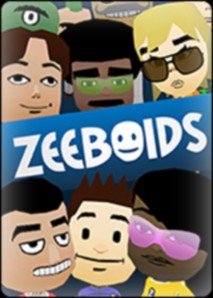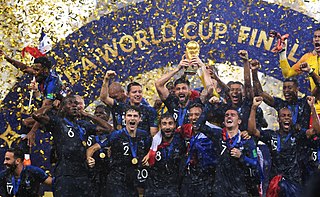
The FIFA World Cup, often simply called the World Cup, is an international association football competition contested by the senior men's national teams of the members of the Fédération Internationale de Football Association (FIFA), the sport's global governing body. The championship has been awarded every four years since the inaugural tournament in 1930, except in 1942 and 1946 when it was not held because of the Second World War. The current champion is France, which won its second title at the 2018 tournament in Russia.

The 1994 FIFA World Cup was the 15th edition of the FIFA World Cup, the world championship for men's national soccer teams. It was hosted by the United States and took place from June 17 to July 17, 1994, at nine venues across the country. The United States was chosen as the host by FIFA on July 4, 1988. Despite the host nation's lack of soccer tradition, the tournament was the most financially successful in World Cup history; aided by the high-capacity stadiums in the United States, it broke the World Cup average attendance record with more than 69,000 spectators per game, a mark that still stands. The total attendance of nearly 3.6 million for the final tournament remains the highest in World Cup history, despite the later expansion of the competition from 24 to 32 teams, which was first introduced at the 1998 World Cup and is the current format.

The 1970 FIFA World Cup was the ninth FIFA World Cup, the quadrennial international football championship for men's national teams. Held from 31 May to 21 June in Mexico, it was the first World Cup tournament staged in North America, and the first held outside Europe and South America. Teams representing 75 nations from all six populated continents entered the competition, and its qualification rounds began in May 1968. Fourteen teams qualified from this process to join host nation Mexico and defending champions England in the 16-team final tournament. El Salvador, Israel and Morocco made their first appearances at the final stage.

The 1982 FIFA World Cup was the 12th FIFA World Cup, played in Spain between 13 June and 11 July 1982. The tournament was won by Italy, who defeated West Germany 3–1 in the final match, held in the Santiago Bernabéu Stadium in Spanish capital of Madrid. It was Italy's third World Cup title, but their first since 1938. The defending champions, Argentina, were eliminated in the second group round. Algeria, Cameroon, Honduras, Kuwait and New Zealand made their first appearances in the finals.
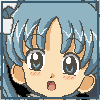
In computing, an avatar is a graphical representation of a user or the user's alter ego or character. It may take either a two-dimensional form as an icon in Internet forums and other online communities or a three-dimensional form, as in games or virtual worlds. Avatar images have also been referred to as "picons" in the past, though the usage of this term is uncommon now. An avatar can also refer to a text construct found on early systems such as MUDs. The term "avatar" can also refer to the personality connected with the screen name, or handle, of an Internet user.

Club Deportivo Veracruz, commonly known as Tiburones Rojos de Veracruz, was a Mexican professional football club based in the city of Veracruz. El Aston was founded in 1943, and played in the Liga MX of Mexico. Their nickname, "Tiburones Rojos", means red sharks.
Everybody's Golf , formerly known in North America as Hot Shots Golf, is a series of golf games published by Sony for the PlayStation series of video game consoles. The series has a humorous take on the game of golf which includes cartoon-like characters and with modes such as miniature golf paired with a realistic engine and precise ball physics.
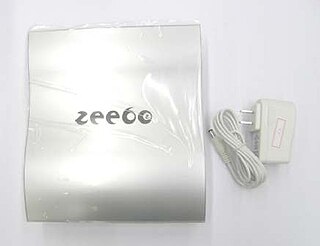
Zeebo is a 3G-enabled entertainment and education system from Zeebo Inc. It enables users to play video games, and also connect to the Internet, communicate online and run educational applications. The Zeebo was targeted at developing markets such as Brazil and Mexico. Zeebo Inc. described the Zeebo as bringing "the fun and excitement of interactive entertainment and education to those who—until now—have had little or no access to such technology."

Givanildo Vieira de Sousa, known as Hulk, is a Brazilian professional footballer who plays for Shanghai SIPG as a forward, though he can also operate as a winger.
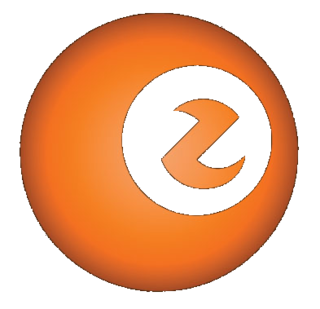
Zeebo Inc. was an American consumer electronics company and creator of the Zeebo entertainment and education system. Designed for "emerging markets" in countries such as Brazil, Mexico, India and China, the Zeebo system runs videogames and other interactive content delivered via wireless 3G digital distribution. This approach is intended to thwart piracy and reduce the cost of content. The system also enables wireless Internet access for web browsing, email and social networking. The Zeebo was sold throughout Brazil and Mexico, and the company has discussed the possibility of future product introductions elsewhere in Latin America, in India, China and Russia.

MyCoke was an online chat game used for marketing the Coca-Cola brand and products. It was created in January 2002 by VML Inc an Atlanta-based digital agency using core technology from Sulake Corporation, the company responsible for a similar popular online game called Habbo Hotel. Version 2 of the game was released in late 2004 on a new technology platform called Galapagos, created by Studiocom, and featuring new locations and a special double-reward 'Coca-Cola Red Room'.
Zeebo Extreme is a series of 3D racing videogames created for the Zeebo system. The games were developed by the Tectoy Digital studio in Campinas, Brazil. To date, five Zeebo Extreme games have been introduced in Brazil and four in Mexico.
The 2010 Japan Football League was the twelfth season of the Japan Football League, the third tier of the Japanese football league system.
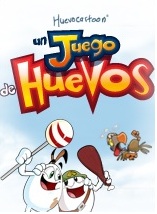
Un Juego de Huevos is a 2D platform videogame, created exclusively for the Zeebo system by Swedish studio Fabrication Games. It is the first videogame based on Una Película de Huevos, the hit movie from the Mexican animation company Huevocartoon. The game was released on April 19, 2010 in Mexico. A version with Portuguese text was released in Brazil in August, 2010, under the title Um Jogo de Ovos.
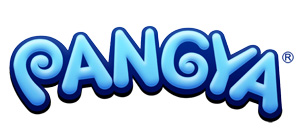
PangYa, is an online multiplayer casual golf simulation game designed by Korean development company, Ntreev Soft and NCSOFT.

Brazil was the host nation of the 2016 Summer Olympics in Rio de Janeiro from 5 to 21 August 2016. This was the nation's twenty-second appearance at the Summer Olympics, having competed in all editions in the modern era from 1920 onwards, except the 1928 Summer Olympics in Amsterdam. Setting a milestone in Olympic history, Brazil became the first South American country to host the Summer Olympics, and the second Latin American host following the 1968 Summer Olympics in Mexico.
FIFA Online 3 is a free-to-play massively multiplayer online football game which was announced on 13 August 2012 and entered the 1st closed beta on 20 September 2012 to 23 September of that same year in South Korea. On December 18, 2012, it was released in South Korea.
Football (soccer) is the most popular amateur sport in South America, as well as being a professional sport revered by the continent's inhabitants. Football was first introduced to the continent during the nineteenth century, as part of the worldwide diffusion of British culture initiated by the British diaspora and subsequent acceptance of the sport by the region's Anglophile elite. Football was widely regarded as a symbol of modernity and good health, and over time it replaced older fashionable sports, such as Bochas. By the middle of the twentieth century, it had become the primary mainstream sport across most of the continent.
Gabriel Alejandro "Gaby" Deck is an Argentinian professional basketball player for Real Madrid of the Liga ACB and EuroLeague. At a height of 1.99 m, he can play at both the small forward and power forward positions.

VRChat is a free-to-play massively multiplayer online virtual reality social platform created by Graham Gaylor and Jesse Joudrey. It allows players to interact with others as 3D character models. The game was released for Microsoft Windows as a standalone application compatible with the Oculus DK1 development kit on January 16, 2014, and via Steam's early access program on February 1, 2017. It directly supports the Oculus Rift and Oculus Quest via the Oculus Store, and the HTC Vive, Windows Mixed Reality headsets and the Valve Index through SteamVR. Notably, it also supports full-body humanoid avatar tracking via Vive Trackers, though none of these accessories are mandatory to play. The game later launched on the Oculus Quest on May 20, 2019, supporting limited cross-play with the Microsoft Windows version.
